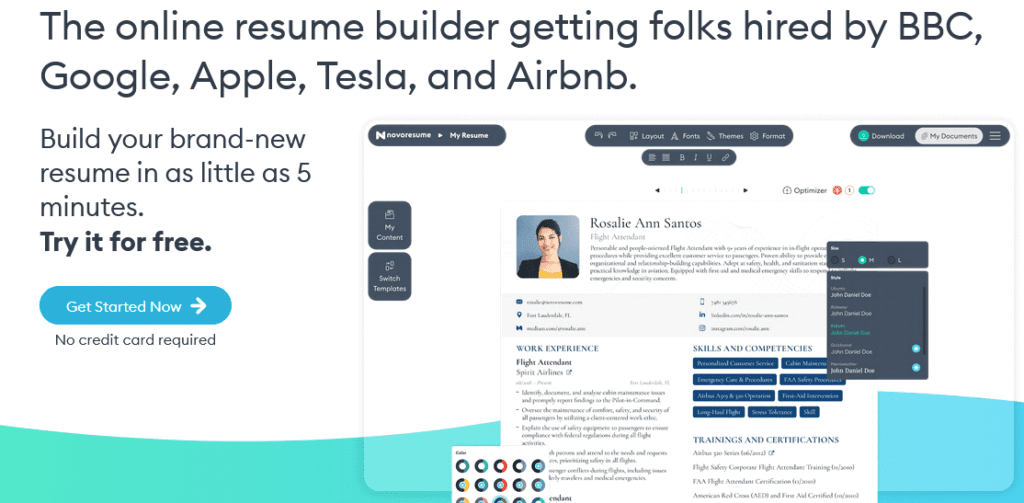Resume writing is a challenging thing. Many people find resume-writing a tough job unless you like talking about yourself. Questions like, “what if you miss something?” or “what happens if you don’t mention an important detail?” are common.
Statistics tell us that the ideal resume has around 450-600 words. Therefore, to be able to describe yourself at that length is vital. Today, we’ll explore the best resume writing tips alongside other key essentials to help you land your dream job. So, let’s begin.
What is A Resume?
A resume is a document that sums up your education and work history. It’s usually the first thing employers will see when they’re looking to hire you. A resume should be concise and easy to read, with relevant details about your skills, qualifications, work experience, and more.
Since a resume is a document that highlights your skills and experience to an employer, it is the first document that candidates send to the employer. Therefore, it could be the deciding factor in whether or not they hire you.
Thus, a resume should include your education, work experience, and other relevant information such as spoken languages or interests. Resumes are usually one of two types:
- Chronological resume
- Functional resume
A chronological resume includes all of your work histories, starting with your most recent job and going backward in time. A functional resume focuses on skills and qualifications instead of employment history, which can be more beneficial for those who have gaps in their employment history.
Why Are Resumes Important?
Resumes are important since they can help you get your dream job. Besides, it allows the employer to fish out the right candidate for the job. By writing a concise resume, you can stand out among other applicants.
That’s why resumes aren’t only important because they improve your chances but also because they can help you stand out among various candidates.
Top Errors to Avoid in Resume Writing
When writing a resume, a lot of people commit mistakes. These errors can be major drawbacks when it comes to the interview if they are ever called for it. So, to help you understand, here are the top errors in resumes committed by people:
- Misspellings
Misspellings are your worst enemy in any sort of writing. Now, resumes are a bridge to careers, and misspellings can damage the pillars of this bridge. So, it’s important to avoid it at all costs.
- Outdated Personal Information
Outdated information like emails, phone numbers, or addresses means you may never hear from an employer even if you’re qualified. So, double-check and ensure this information is up-to-date.
- Invalid File Names
If you’re applying for an engineer, then you should apply using it in the title in your resume, such as “Engineer – Candidate Name.” This will let the HR department know which job you’ve applied for.
- Employment or Education History
Employment or education history is important, and some people end up omitting key details, such as achievements or the times they stood out from their peers. So, one of the major errors is to miss out on such details.
Top 9 Resume Writing Tips to Land Dream Job
Now that key things are out of the way, let’s dive right into the top 9 resume writing tips which can help you formulate an outstanding CV.
- Keep it Short
Keeping it short and concise needs to be one of your priorities. You could be a college leader and have many accomplishments at previous jobs. But let their certifications do their job.
While mentioning those accomplishments is important, it’s even more important to ensure that you’re not bragging. So, keep it short.
- Write A Personal Profile
Personal profiles are important in a CV. Now, this doesn’t include your personal struggles or family history. A personal profile is your aim and how you got to where you are today.
This might include a little story about when you stood out in a crowd. Anything that could help you capture the attention of your potential employer.
- Attach Your Cover Letter
Cover letters are important, and they are more job-centric than your resume. Therefore, if you’re applying for various jobs, make sure you’re writing separate letters for them.
This will help you bring attention to specific sections in your resumes, such as your education, work experience, or skills.
- Focus On Related-Skills
It is important to include all of your relevant skills, education, work experience, and other information about yourself on the resume.
But, it’s even more important to be industry-specific and relevant. So, don’t mention your footballing tricks while applying for an industrial job.
- Write Job-Centric Resumes
Another thing you can do besides writing separate cover letters makes separate resumes. Now, this may not be recommended in all industries, but it works.
Now, many people have varying skills and educations. So, we suggest that you make the relevant information more prominent.
- Write an Outstanding Summary
You have to write a summary at the end of your resume to sum it all up. Or, you can write one in the beginning. Here’s what you should do:
- Head to a paraphrasing tool
- Pick up a content tone

- Rephrase your summary

- Done
This will allow you to keep your summary in a professional tone. And in the process, it’ll fix any other errors like grammatical or readability issues.
- Format It Correctly
Formatting a resume is key. You can be creative in things like graphic design or any other creative working field.
However, try to be as formal as possible for industrial or technical jobs. Then again, try to find resumes of successful people in your niche or industry.
- Don’t Miss Out on Personal Information
Personal information about your phone numbers, emails, and addresses must be double-checked. Therefore, ensure you’re using valid and fresh information, and avoid the errors we mentioned earlier.
- Always Check Spellings
Spellings are an adamant thing, and you cannot err them. Therefore, make sure you double-check the spelling of everything you write. Use a program like Grammarly if you have to, or just keep proofing on in a program like MS Word.
2 Suggested Tools for Resume Writing
In order to write outstanding resumes, we suggest you employ these two tools:
Paraphraser.io is one of the leading paraphrasing tools available today. Whether you wish to correct the tone of your resume or write a good summary, this one should be your go-to option.

On top of that, it offers 500-words, which is just about the length you need to write an adequate resume.
Also, after you paraphrase your resume, be sure to check it for readability, as after paraphrasing your text, it could become more complicated and less clear. A special tool from StudyCrumb called the Readability Checker will help you with this
Novo Resume is an online resume writer which allows you to write resumes for free. It allows you to pick a format and fill it away.

However, you will require the premium version if your CV surpasses two pages or more.
Conclusion
These are some of the best resume-writing tips you can use today. Not only will it ensure that you stand out at a crowded desk full of resumes, but also in the eyes of your employer and interviewee. So, make sure you follow each tip carefully.



